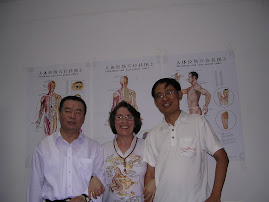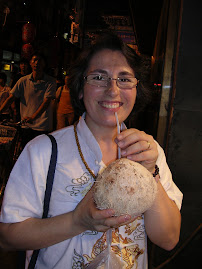
Tomatoes are a good source of the antioxidants lycopene and beta-carotene. But if you eat a tomato without adding a little fat, your body is unlikely to absorb all these nutrients.
Scientists recruited graduate students to eat bowls of salad greens with tomatoes and various types of salad dressings. The researchers put IV lines into the participants' veins and drew blood samples before and after they'd eaten the salads in order to get precise measurements of the absorption of nutrients.
When researchers went back and analyzed the blood samples, they realized that people who had eaten fat-free or low-fat dressings didn't absorb the beneficial carotenoids from the salad. Only when they had eaten the oil-based dressing did they get the nutrients.
Tomatoes have long been known for their health benefits -- courtesy of lycopene, an antioxidant carotenoid whose health benefits include reduced risk of
cancer,
atherosclerosis, and
exercise-induced asthma, just to mention a few.
Lycopene gives tomatoes their red color, and works by fighting damaging free radicals in your body.
But there are at least a couple of caveats that you need to be aware of.
Secondly, in order to absorb its nutrients, you need to eat your tomatoes with a little bit of fat.
The Case Against Low- or No-Fat Diets
Low fat or even no-fat diets can have potentially devastating results. These types of diets can have very far-reaching negative consequences that few people are aware of.
This is especially true if you are a protein type in the
nutritional typing system. Those that are carb types tend to do much better and even thrive on low fat diets, but we all need some level of fat. Carb types just tend to do well with far less fat.
Modern nutrition counsel has made a huge mistake in teaching that low-fat diets are healthy for your heart and lead to weight loss.
Marketers of low-fat foods have championed this concept, and there are low-fat varieties of nearly every food you can think of.
This is a serious mistake. Please do not fall for this common misconception!
Along with
fat-soluble vitamins, such as vitamins A, D, K and E, certain antioxidants, like the carotenoids, also need fat in order to be absorbed and metabolized properly. Without sufficient amounts of healthy fat in your diet, you’re likely to develop a variety of nutritional deficiencies, even if you eat plenty of vegetables.
Choosing a Healthy Fat
Olive oil, especially extra-virgin olive oil, is an excellent choice for this purpose and obviously has been used for many centuries in Mediterranean cultures. I grew up in an Italian home and olive oil was a common staple in my diet.
Olive oil is primarily a monounsaturated fat and contains major health benefits because of its vitamin E and A, chlorophyll, magnesium, and a host of other cardio-protective nutrients.
As you may already know, olive oil should NOT be used for frying.
Drizzled on salad instead of a low-fat, processed dressing, olive oil is hard to beat in terms of health benefits. (When choosing an oil to cook with, you’ll want to pick one that will not be damaged by high temperatures. One of your absolute best choices is
coconut oil, which is rich in lauric acid -- a proven antiviral and immune system builder.)
Numerous epidemiological studies have confirmed that the Mediterranean-style diet, which is high in olive oil, has significant protective effects against cancer, heart disease and aging.
Other studies have shown that extra-virgin olive oil can reduce some cancers, reduce LDL cholesterol levels, and improve rheumatoid arthritis; the same or similar benefits touted by the
Mediterranean diet, and diametrically opposed to the effects of the low-fat diet.
However, tomatoes likely contain additional beneficial substances that are lost or destroyed when the tomatoes are cooked, especially if they undergo additional processing. So substituting ketchup, for example, for fresh tomatoes will not do you any good (for a variety of reasons).
But tomatoes are not the only food containing beneficial lycopene. Below is a table listing the
lycopene content of several foods:
Approximate Lycopene Content of Various Foods
- Apricot, dried - 0.86
- Grapefruit, raw pink - 3.36
- Guava, fresh - 5.40
- Guava juice - 3.34
- Papaya, fresh - 2.00-5.30
- Tomatoes, fresh - 0.88-4.20
- Tomatoes, cooked - 3.70
- Tomato sauce - 6.20
- Tomato paste - 5.40-150.00
- Tomato soup, condensed - 7.99
- Tomato powder, drum or spray dried - 112.63-126.49
- Tomato juice - 5.00-11.60
- Sun-dried tomato in oil - 46.50
- Watermelon, fresh - 2.30-7.20
Source: Clinton, -S.K.1998. Lycopene: Chemistry, Biology, and Implications for human health and disease, Nutrition Review,56(2)P35-51
Carotenoids, such as lycopene, are the pigments responsible for red, yellow, and orange colored fruits and vegetables. They’re also found in some dark green vegetables such as spinach.
Other Ways to Maximize Absorption of Nutrients
In addition to adding a little fat to your tomatoes or other carotenoid-containing veggies, there are other ways to help maximize the absorption of its nutrients.
As explained in the article above, the finer the particle size, the better the absorption of beta-carotene.
This is one of the reasons why juicing is so beneficial.
And it’s not just beta-carotene that becomes more absorbable through juicing, but ALL nutrients are more easily extracted this way.
Juicing according to your nutritional type is strongly recommended for optimal health, especially if you are a carb type, since many people find it difficult to consume large amounts of vegetables.
If you’re a protein type, you’ll need to be more cautious in your juicing. The only vegetables recommended for protein types are your prime protein-type vegetables, which are celery, spinach, asparagus, string beans, and cauliflower. (Spinach, as already mentioned, contains carotenoids, just like tomatoes.)
You already know it is difficult to get enough whole, raw vegetables in your diet. Realizing that you also need healthy fats to get the most out of your diet can make an enormous difference in your health.Remember the KEY is to select the right fats and avoid the toxic fats. This is one of the most important nutritional principles to remember. I really believe that the consumption of toxic fats for many is one of their worst health habits , and can contribute to premature death and needless pain and suffering.
Related Links:
The Natural Cancer-Fighting Power of Tomatoes and Broccoli
Beginner Plan: Fats
Surprise -- Saturated Fat Really Is Good For You






















.jpg)
.jpg)


.jpg)
































No comments:
Post a Comment